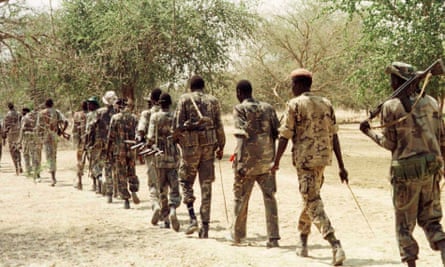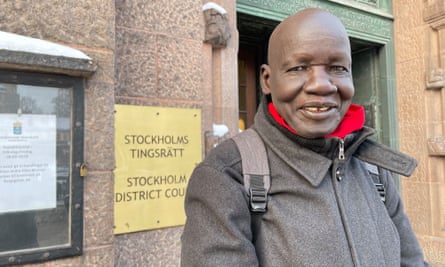George Tai Kuony recalls a peaceful life in his hometown of Leer, now located in South Sudan, before Lundin Oil arrived. He describes his childhood as that of a typical village boy, where he would tend to cattle, assist his family, and attend school. However, everything changed in June 1998, when armed forces entered the town and permanently altered his life.
After escaping, he got separated from his family and stayed hidden for a week until he could go back. The 40-year-old attorney and advocate for human rights recalls, “When we arrived, Leer was unrecognizable from the town I left seven days prior. It was all in ruins, completely destroyed. Corpses of the deceased were scattered on the streets.” Due to the violence, he lost his father and later his mother and one sibling.
During that period, he recalled, the local community was unaware of the reasons behind the conflict. The Swedish oil company involved was unfamiliar to them. Now, 25 years later, Kuony is hopeful that he and the other victims will receive justice as two former company executives face trial in Stockholm for their alleged involvement in war crimes in Sudan from 1999 to 2003.
In the biggest trial ever held in Sweden, Ian Lundin, a citizen of Sweden, and Alex Schneiter, who is from Switzerland, are being accused of requesting the Sudanese government to assign the responsibility of security at a Lundin Oil exploration site to their army and allied militia. This resulted in airstrikes, deaths of innocent civilians, and destruction of entire villages, as stated by the prosecution. However, both men have pleaded not guilty to the accusations.
The court proceedings, which come after a ten-year inquiry, numerous interviews, and an extensive 80,000-page document compiled by the prosecution, commenced in September. However, the most noteworthy events are predicted to occur in 2024 when 61 individuals, such as victims, Lundin employees, former UN personnel, and prominent politicians, are scheduled to testify. This group includes Carl Bildt, the previous prime minister of Sweden, who served on the company’s board for five years before becoming the country’s foreign minister.

“My life has never been the same,” says Kuony, speaking to the Observer from South Sudan’s capital, Juba, where he now lives. “Oil came to our area: it should have been a blessing. It should have been for the benefit of the community.” Instead, there was “a massacre. They wanted us dead. They wanted us to go away.”
Since 2006, Kuony has been striving for justice. The group attempted to seek resolution at a Sudanese court, but was unsuccessful. Kuony believes that the trial, regardless of its verdict, will establish a new legal standard for multinational companies operating in other countries. This will send a clear message that they cannot behave recklessly without consequences and may one day face prosecution.
However, the victims have already suffered a major setback. Ebony Wade, a legal advisor at the human rights organization Civil Rights Defenders in Stockholm, explained that the court’s ruling in November to separate the plaintiffs’ compensation claims from the criminal trial will greatly hinder their ability to have their cases heard and will significantly prolong the pursuit of justice.
The plaintiffs’ testimonies were anticipated to be included in the criminal trial, but this could delay the civil claims until after the criminal trial concludes in February 2026. Nevertheless, May 2024 will mark a significant occasion as the court will finally listen to the stories of plaintiffs and victims from South Sudan.
Wade states that it is highly uncommon for corporate leaders to face consequences for serious human rights abuses. This marks the first instance where the top officials of a multinational corporation are being brought to trial in a European nation for their alleged involvement in war crimes through their business operations.
She states that this trial is highly significant because there are limited chances for individuals who have experienced severe international crimes to seek justice.

Rev. James Ninrew Dong, a clergy member of the Presbyterian Church in South Sudan, left Leer after religious structures were attacked. As both a witness and a plaintiff in the situation, the priest felt obligated to share his testimony: “They assaulted us. They uprooted us. What saddened me was that individuals sought refuge in the church, but were unable to find it. They were also forced to leave.”
According to him, the situation showcases the varying criteria used by European businesses in Africa. He states, “Sweden is known for promoting peace throughout Europe and it’s also where the Nobel Prize is awarded.” He adds, “We were taken aback to see that some individuals from the same country show no concern and disregard the significance of history.”
He states that it is a relief for the case to finally reach the court. He questions if such actions are possible in Norway, Sweden, or any other European country, but the answer is no.
Source: theguardian.com


















